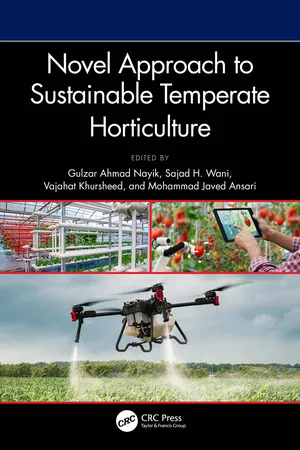
Novel Approach to Sustainable Temperate Horticulture
- 312 pages
- English
- ePUB (mobile friendly)
- Only available on web
Novel Approach to Sustainable Temperate Horticulture
About This Book
In the current scenario, marked by a continual improvement in living standards, it becomes imperative to boost the productivity as well as the efficiency of agriculture, especially horticulture, which holds the potential for significant economic prosperity aligning with Sustainable Development Goal number 8, "Decent Work and Economic Growth". Modern technological interventions, such as geospatial technology and geographic information system (GIS) technology, can be harnessed to yield effective results in addressing challenges and providing enhanced decision support, particularly in the planning of horticultural resource management. Cultivation and production of fresh produce face several challenges, including prolonged juvenile phases and reproductive cycles with extended breeding periods, creating bottlenecks in the process. The evolving trends in biotechnology offer promising solutions for improving the selection of desirable traits. Biotechnological techniques aimed at improving fruit efficiency encompass tissue culture, induction of genetic variability, germplasm conservation, and molecular breeding/genomics. These methods involve the study of genetic diversity, DNA fingerprinting, and Quantitative Trait Loci (QTL) analysis for marker-assisted selection. Over the past few decades, the global population has consistently risen, raising concerns about the ability of the current food system to adequately feed the anticipated 10 billion people in the next 30 years. While this challenge is deemed achievable, certain changes in both food production and consumption systems are essential to ensure sustainability, reduce food loss and waste, and contribute to a global shift toward healthier and more sustainable diets. Implementing sustainable models of crop production represents a significant undertaking. To address the growing food demand amid deteriorating production environments, there is a need for promising technologies and effective management options to enhance productivity.
This book is poised to be a valuable resource for horticultural scientists operating in universities, government agencies, and research centers, offering insights into achieving sustainable cultivation practices for fruits. It stands out as the first of its kind, providing in?depth knowledge on environmentally friendly methods for cultivating temperate fruit crops, to reduce harmful emissions and pollution. This book will delve into the application of geographic information system (GIS) for estimating horticulture area expansion and crop yield. Additionally, it will encompass recent biotechnological interventions in horticulture, circular agriculture models, and emerging non?thermal food preservation techniques as significant components.
Features:
- Aims to provide a comprehensive and integrated overview of current techno-statistical techniques employed in horticulture, delving into the associated livelihood benefits derived from the practice.
- Explores the novel geographical trends to identify the site suitability indices of several temperate fruits.
- Offers a comprehensive and integrated exploration of recent trends in biotechnological approaches aimed at enhancing food production, quality, and safety.
Frequently asked questions
Information
Table of contents
- Cover
- Half Title
- Title Page
- Copyright Page
- Dedication
- Table of Contents
- Preface
- Editors Biography
- List of Contributors
- Chapter 1 Estimation of Horticulture Area Expansion and Crop Yield Quantification by Using Remotely Sensed Data and Geographic Information Systems
- Chapter 2 Cost-Benefit Analysis and Measuring Livelihood Development Index of Horticulturalists in Kashmir Valley
- Chapter 3 Recent Advances in Rootstock and Varietal Improvement in Horticulture Crops
- Chapter 4 Biotechnological Intervention in Horticulture
- Chapter 5 Potential of Nanotechnology for Improving Nutrient Efficiency of Temperate Horticulture Crops
- Chapter 6 Role of Digital Technologies in the Field of Horticultural Science and Technology
- Chapter 7 Strategies for Adding Value to Food Byproducts (Recovery and Valorization)
- Chapter 8 Emerging Non-thermal Food Preservation Techniques
- Chapter 9 Circular Models and Strategies to Reduce and Reuse Food Waste
- Chapter 10 Environmentally Friendly Food Processes, Biorefineries and 3D Food Printing
- Chapter 11 Biotechnological Approaches to Increase Food Production Quality and Safety
- Index